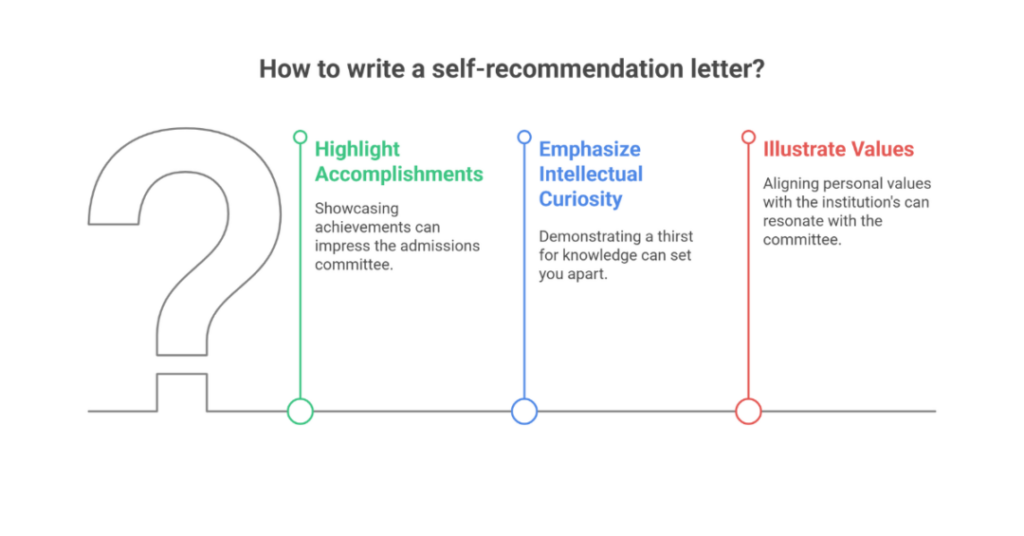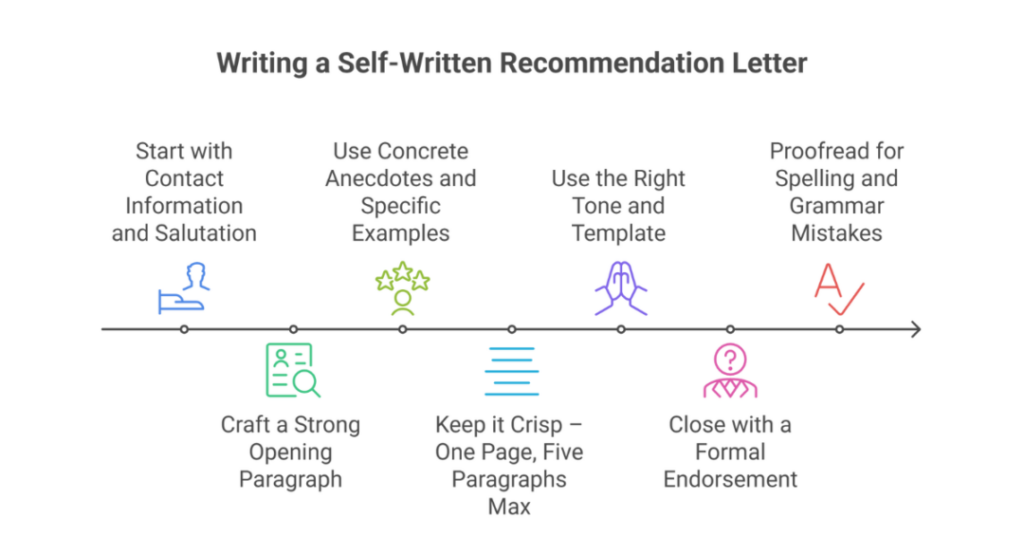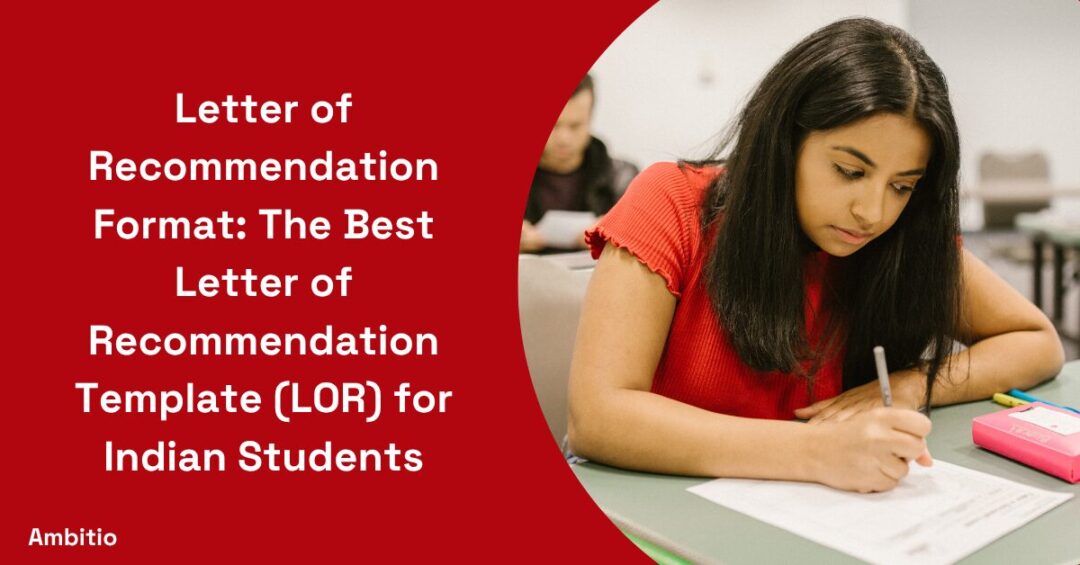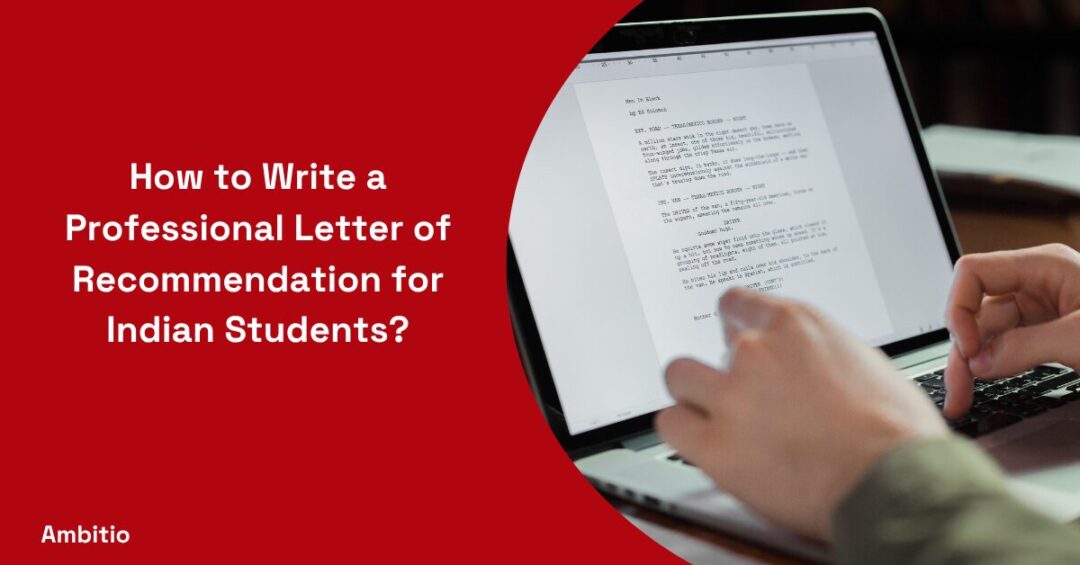2 July 2025
7 minutes read
How to Write a Letter of Recommendation for Yourself (With Examples)

Key Takeaways
- How to write a letter of recommendation for yourself starts with structure, honesty, and real examples that reflect your true strengths.
- Use specific, measurable achievements—avoid fluff and cliché to make your letter memorable and impactful.
- Involve your recommender early and tailor the letter to the program’s goals for maximum authenticity and relevance.
“More than 50% of recommenders ask applicants to write the first draft themselves”, and yes, it feels awkward. You’re essentially praising yourself without sounding arrogant, while pretending someone else is saying it. Tough, right?
But here’s the real issue: most people either freeze or write a vague, forgettable note that ends up hurting their chances. The solution? Learn how to write a letter of recommendation for yourself with confidence, real, specific, and structured. This guide breaks it down into steps that actually work.
What is a Self-Recommendation Letter?
A self-recommendation letter is when the applicant is asked to write their own letter of recommendation, usually by a mentor or recommender who’s pressed for time. It’s a common part of the application process for a graduate program, a job, or even medical school.

While it may feel odd, it’s your chance to highlight accomplishments, intellectual curiosity, and values using concrete examples. Knowing how to write a letter of recommendation for yourself can genuinely increase your chances of impressing the admissions committee.
Why You Might Need to Write a Letter of Recommendation for Yourself?
You might need to write your own recommendation letter when a recommender, a professor, mentor, or former manager, asks for an initial draft due to time constraints.
This is more common than you’d think, especially in school applications or when applying to a graduate program, like a recommendation for medical school.
While it may seem odd, this is your opportunity to take control of your narrative. You can craft a clear thesis statement, include specific examples, and exemplify your best qualities in one well-structured paragraph after another.
Knowing how to write a letter of recommendation for yourself ensures your reference letter avoids clichés, reflects your true value, and meets the formal letter format that admissions officers expect.
Is It Ethical to Write Your Own Letter of Recommendation?
Yes, it’s ethical, if done transparently. Many professors and supervisors, especially those with years of teaching or managing roles, often ask you to write your letter simply because they’re tasked with writing dozens of them and are pressed for time.
In fact, the letter of recommendation is written by the applicant in many cases, especially during medical school personal statements or graduate school application processes.
The key is to stick to the point of a recommendation: showcasing your accomplishments and strengths honestly. Use specific examples, avoid generic adjectives, and format it like a professional business letter with a clear salutation, letterhead (if needed), and formal sign-off.
Knowing how to write a letter of recommendation for yourself ethically means helping your recommender’s voice shine while still giving the admissions support team exactly what they need to see.
How to Write a Self-Written Letter of Recommendation?
So, you’ve been asked to write your own recommendation letter, awkward but completely normal. Many students in the class or early-career professionals are surprised when a mentor or recommender says, “Please feel free to draft something and I’ll review it.”

Whether you’re applying to a strong medical school or a non-science graduate program, knowing how to write a letter of recommendation for yourself can seriously impact your chances of getting accepted. Here’s a clear, professional guide to help you succeed:
- Start with Contact Information and Salutation
Follow a formal business letter format. Add the recommender’s name, title, institution, and email. Include the date, then write a clear salutation like “To the Admissions Committee.” - Craft a Strong Opening Paragraph
Briefly introduce who the applicant is, how long the recommender has known them, and in what capacity (e.g., student in the class, intern, research assistant). Mention one standout quality right away. - Use Concrete Anecdotes and Specific Examples
The body should include 2–3 paragraphs expanded upon with real, detailed experiences that highlight work ethic, intellectual curiosity, or how the student excelled academically. This is what makes the candidate stand out. - Keep it Crisp – One Page, Five Paragraphs Max
Admissions officers read many applicants’ files. Stick to one page. Avoid fluff or cliché terms, focus on real accomplishments and strengths. - Use the Right Tone and Template
Write with humility but clarity. Avoid sounding robotic. Use readable fonts like Times New Roman. A well-structured template can guide your tone without making it feel generic. - Close with a Formal Endorsement
Wrap up with phrases like “I wholeheartedly recommend [Name] for [Program]” and offer to provide further input: “Please feel free to contact me for more information.” - Proofread for Spelling and Grammar Mistakes
Since this is part of the official writing process, small errors can make a big difference. Read aloud and double-check everything before sharing the initial draft.
These steps will help you write a recommendation letter that is sharp, authentic, and tailored to your school application, while giving your recommender exactly what they need to sign off with confidence.
Tips for Writing a Persuasive and Authentic LOR for Yourself
You’re writing a recommendation letter for yourself, not because you want to, but because your recommender asked you to draft it first. That’s okay. Most letters of recommendation as part of college or grad school applications start this way.
Whether it’s a letter of recommendation for Masters in Computer Science or a leadership program, the trick is to be specific, honest, and far from cliché. Here are steps to help you write a compelling draft your recommender can endorse without hesitation.
- Understand the Point Before You Begin
Before anything, understand the difference between a letter of recommendation and reference letter. A recommendation speaks to your academic/work ethic; a reference is more casual. If you’re aiming for grad school or research roles, this letter must be formal, structured, and evidence-backed. - Provide Examples, Not Fluff
Instead of calling the student an excellent candidate or hardworking, show it. Use measurable impact: “During her time in my school class, she completed a data science project that later won third prize at the University of Michigan tech fair.” Always include in your letter at least 1–2 success stories expanded upon in the body. - Use the Right Format
Stick to the academic letter of recommendation format: salutation, 3–5 clear paragraphs, and a closing endorsement. Use a professional font and header. Wondering how long should a letter of recommendation be for college? Keep it to one page, quality matters more than length. - Avoid Generic Adjectives
Avoid overused descriptors like “motivated,” “great,” or “talented.” Many applicants use them, so they don’t stand out. Instead, describe how the applicant’s skill evolved over time, their contribution to group tasks, or moments where they exceeded expectations. - Align with the Program’s Goals
If you’re writing for a letter of recommendation for Masters in Computer Science, tailor it accordingly. Showcase problem-solving, coding ability, algorithmic thinking, or teamwork qualities CS admissions officers are looking for. - Add a Clear Closing with a Call to Action
Conclude with phrases like, “I strongly recommend [Student Name] for your program,” and a clear call: “Please feel free to reach out for additional insights.” Yes, a letter of recommendation needs a date and should have the recommender’s contact information. - Involve Your Recommender Actively
Even if you’re writing, encourage your recommender to tweak the final version. This creates authenticity. Send the draft early—ideally, how long in advance to ask for a letter of recommendation? At least 3–4 weeks. If they forget, here’s how to politely remind someone about a letter of recommendation: be respectful, brief, and appreciative. - Stay Professional if It’s for Executives
For work-related programs or MBAs, refer to an executive letter of recommendation sample. Highlight leadership, strategic thinking, and impact. Structure it like a formal business communication, not a casual note. - Final Thoughts: Proofread and Personalize
Lastly, proofread thoroughly. Check for spelling, grammar, or awkward phrasing. Avoid reusing a template blindly; tailor each draft to the program. Whether you’re figuring out how to send letters of recommendation to colleges or prepping your LOR for grad school, every personalized touch increases your chances of standing out.
Sample Letter of Recommendation You Wrote for Yourself
When you’re learning how to write a letter of recommendation for yourself, the key is to strike a balance between professionalism and authenticity, avoiding cliche while still presenting the student’s strengths convincingly. Below is a strong 300-word example of a self-written LOR for an undergraduate student applying to a research internship:
To the Admissions Committee,
I am pleased to recommend Priya Sharma, a final-year Computer Science undergraduate at ABC University, for your Summer Research Internship Program. As Priya’s Data Structures professor and project mentor for two semesters, I’ve had the opportunity to observe her intellectual curiosity and consistent drive to excel in both academic and collaborative settings.
What distinguishes Priya from most undergraduates is her ability to apply theory to real-world problems with both creativity and precision. In a recent semester project, she developed a graph-based route optimization tool using Dijkstra’s algorithm, which outperformed existing benchmarks by 12%. She not only led the technical implementation but also facilitated peer discussions, embodying both leadership and humility.
Beyond academics, Priya is known for her discipline, quick adaptability, and strong work ethic. She is the kind of student who proactively seeks feedback and iterates fast, making her a joy to mentor. Her contributions during our university’s annual tech symposium, where she coordinated over 30 participants while managing backend logistics, reflect her strong organizational and interpersonal skills.
I am confident that Priya will bring this same level of energy, intelligence, and rigor to your program. She is a capable learner who thrives in challenging environments and would be an asset to any research-focused team.
Please feel free to contact me for further information.
Sincerely,
Prof. Rajiv Menon
Department of Computer Science
ABC University
[email protected]
This sample not only shows you how to write a letter of recommendation for yourself, but also how to do it with impact, through real achievements and tone that feels both honest and professional.
Conclusion
Writing your own letter of recommendation might feel unusual, but it’s your chance to showcase your journey with clarity, confidence, and real impact. From highlighting your strengths to structuring it with precision, you now know how to write a letter of recommendation for yourself the right way.
Want expert help to perfect your drafts, build a standout profile, or get into your dream university? Join Ambitio, your go-to partner for study abroad success and profile building. We don’t just guide; we strategize, mentor, and elevate your entire application.
FAQS
Can I write my own letter of recommendation?
Yes, especially if asked by a recommender who knows your work but needs help articulating it.
What tone should I use?
Maintain a professional, humble, and confident tone without sounding boastful.
What key points should I include?
Highlight your skills, achievements, work ethic, and specific examples of your contributions.
How long should the letter be?
Keep it concise, ideally one page or 3-4 paragraphs.
Should I address weaknesses in the letter?
Focus primarily on strengths; if mentioning weaknesses, frame them as areas of growth.
How do I make it credible?
Use specific facts, measurable results, and mention your relationship with the recommender.
What format is best for the letter?
Use a formal letter format with a clear introduction, body, and conclusion.

You can study at top universities worldwide!
Get expert tips and tricks to get into top universities with a free expert session.
Book Your Free 30-Minute Session Now! Book a call now




























